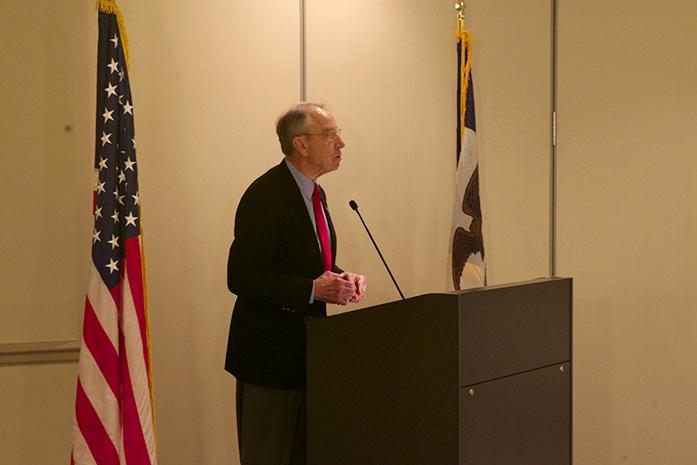Sen. Chuck Grassley, R-Iowa, is still in agreement with Senate Majority Leader Mitch McConnell, R-Ky., that the next president should select a new nominee to the Supreme Court, but he has gone back and forth in recent days about how and how quickly it should be filed.
In a brief interview Thursday, Grassley iterated previous comments he made earlier this week to Radio Iowa that he will take the court considerations “step-by-step.” The senator’s careful wording allows for a possible opening to his power to hold confirmation hearings after a nominee is named.
Justice Antonin Scalia passed away from natural causes at a luxury resort in West Texas on Feb. 13, leaving an empty seat on the Supreme Court.
Grassley chairs the influential Senate Judiciary Committee, which is in charge of spearheading hearings prior to a Senate vote on confirmation of federal judges, including Supreme Court justices.
As chairman, Grassley has a commanding front seat to all of that action.
In less than a month, Grassley’s political perspectives have been thrust into the national spotlight and into the minds of voters who may otherwise know him as a federal whistleblower or Washington’s social-media darling.
“The fact of the matter is that it’s been standard practice over the last nearly 80 years that Supreme Court nominees are not nominated and confirmed during a presidential election year,” Grassley’s initial statement on the next justice appointment said on Feb. 13.
RELATED: Grassley mum on Supreme Court nominee hearing
Historically, Supreme Court nominees passed with little debate in the Senate, even in presidential election years.
If Grassley were to take up Obama’s nominee, it could send the Senate into a political storm.
“All of our phones are lit up right now,” one Grassley staffer said on Thursday afternoon, a reference to an uptick in interest in his office following Scalia’s death. The staffer spoke on the condition of anonymity to speak openly about Grassley’s office procedures.
Nominated to the court by President Ronald Reagan in 1986, Scalia, a native of Trenton, New Jersey, was revered as a conservative lion. Serving on the court for nearly 30 years, Scalia made up what has become a solid four-vote conservative wing in recent years. He wrote a number of important opinions, including a 2008 decision in which a 5-4 majority found that the Second Amendment protects an individual right to bear arms.
Grassley also has said that his recent responses have been in keeping with a July 2007 statement from Sen. Chuck Schumer, D-N.Y. At that time, Schumer said that the Supreme Court was out of balance and except in “extraordinary circumstances,” the Senate should not approve any other nominations from then-President George W. Bush.
But the Iowa senator has also expressed skepticism over blocking judicial nominees in the past.
“Regardless of what party you favor and what you think of the guy, he’s clean-cut,” said Jared Manternach, a 21-year-old UI student who interned with Grassley’s administrative and press team last summer in Washington.
Manternach, one of many registered Democrats who have worked in Grassley’s office over the years, said the next few months could redefine his legislative legacy.
“I know that he would say this is not his defining moment, but it’s definitely going to have a big impact,” he said.



